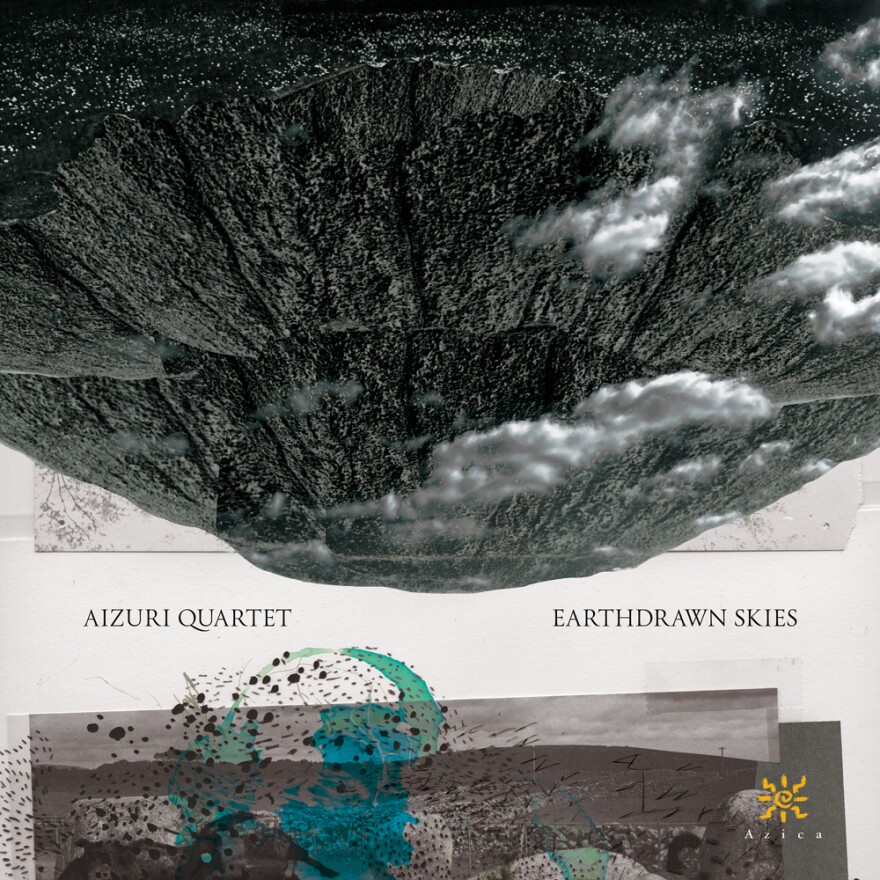On its new album, Earthdrawn Skies, the Aizuri Quartet convincingly connects the dots in wildly diverse music stretching over eight centuries. There are moments of serene reverie, clamorous esprit and sober self-scrutiny, even a folk dance or two — yet it all makes sense on a recording that functions as well on paper as it sounds in practice.
In the liner notes, the band points to an intellectual theme that threads the album's disparate pieces together. Earthdrawn Skies, it writes, is a showcase of "deep connections between humankind and the natural world through the distinct lenses of four composers forging personal relationships with the soil and the stars." While that may be true — and fascinating in itself — you don't need that information to hear how well the individual works flow naturally from one to the next, like a good mixtape.

The opening, chant-like music by Hildegard von Bingen, the 12th century abbess, visionary and scientific author, sets the foundation that will support the album's reflective mood. An arrangement of her Columba aspexit offers a sedative drone, crystalline transparency and a lovely meandering, lyrical line.
The ear-opening discovery on the album is surely the String Quartet No. 1 by Eleanor Alberga, now in her early 70s and worthy as ever of a far greater level of visibility. The music was inspired by a physics lecture wherein Alberga was surprised to learn that all matter, including ourselves, comes from star dust. At the heart of the piece is a tremulous yet meditative central section, which the composer describes as "stargazing from outer space." Rhythmically spasmodic flanking movements come off as so many luminous cosmic particles colliding to form melodic cells, only to burst apart again.
Planting the listener solidly back on earth are five short arrangements of Armenian folk songs by the singer, teacher and ethnomusicologist Komitas Vardapet. They range from bittersweet and lyrical ballades ("It's Cloudy") to punchy hoedowns ("Dance from Echmiadzin"). You can almost smell the loamy soil in these lovely homespun pieces, composed in the early years of the 20th century.
The final work on Earthdrawn Skies brings us deep into the Nordic forest — and into the unsettled mind of the venerated Finnish master Jean Sibelius, circa 1909. Desperate to curb the composer's heavy drinking, Sibelius' family devised something of an intervention: Move away from Helsinki, with its big-city temptations, and into a newly built villa within the massive pine forests some 25 miles north. Here is where Sibelius wrote his only mature string quartet, "Voces Intimae," a subtitle that suggests an intimate conversation, perhaps with oneself.
While the overall effect of this 30-minute quartet is all shadowy self-reflection, there are brief flashes of nervous optimism in the two scherzo-like movements, played with extra zest by the Aizuris, and in the finale, which offers a whiff of folk fiddling. Still, the dark soul of the quartet smolders in a brooding adagio which, near its end, reveals a grim soliloquy for the cello — a depiction, perhaps, of a tormented man searching for direction.
In a little over an hour, Earthdrawn Skies has done its work well — arousing solemn contemplation, cosmic curiosity, folksy delight and introspective scrutiny.
Copyright 2023 NPR. To see more, visit https://www.npr.org.




